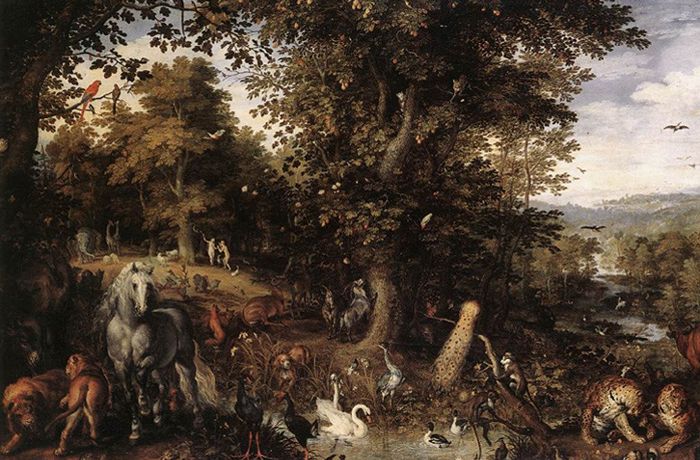Did God reveal His laws from the beginning, or were the 10 Commandments unknown until Sinai? Were God’s 10 Commandments in effect before Moses?

God's 10 Commandments were in effect from the beginning of creation, including in the Garden of Eden.
Did the 10 Commandments exist before Moses?
Yes. Evidence from the Bible reveals that God’s law—including the 10 Commandments—was in effect long before Moses was ever born.
God gave the 10 Commandments to the people of Israel from Mount Sinai about two months after Moses led them out of Egypt. This is recorded in Exodus 20:1-17.
But was this the first time these laws were given to human beings? Or were these commandments known to people long before Moses’ time?
The answer is found in a fascinating statement God made about Abraham, recorded in Genesis 26:5: “Abraham obeyed My voice and kept My charge, My commandments, My statutes, and My laws.”
This is significant because Abraham was born hundreds of years before Moses received the law on Mount Sinai!
In order for Abraham to obey God’s commandments, statutes and laws, he had to know what they were. This means that Abraham was taught the laws directly from God or from others (or possibly both). God was not giving Moses a brand-new law on Mount Sinai. He was merely giving a codified, or formal, version of His law so that it could be used to govern the emerging nation of Israel.
Another reason we know that the law existed before Moses and Mount Sinai is that the Bible refers to sin many times before Moses (Genesis 4:7; 13:13; 18:20; 39:9; 42:22; 50:17; etc.).
But what is sin? The Bible defines sin very simply: “Sin is the transgression of the law” (1 John 3:4, King James Version). If sin is defined as transgressing, or breaking, law, then law has to exist prior to the sin. Paul wrote clearly that “where there is no law there is no transgression” (Romans 4:15). You can’t transgress the law without there being a law to transgress!
So all the individuals who are described as sinning in the book of Genesis broke the law hundreds of years before it was later codified on Mount Sinai.
The 10 Commandments were known and understood long before Moses was born.
The 10 Commandments before Moses
Let’s explore examples of the 10 Commandments being understood long before they were codified in Exodus 20.
The First and Second Commandments
The First and Second Commandments state: “You shall have no other gods before Me [God]” and, “You shall not make for yourself a carved image . . . you shall not bow down to them nor serve them” (Exodus 20:3-5).
God worked with the patriarch Jacob hundreds of years before Moses. After God spoke to Jacob, notice what he did with the idols that were among his household:
“Then God said to Jacob, ‘Arise, go up to Bethel and dwell there; and make an altar there to God, who appeared to you when you fled from the face of Esau your brother.’ And Jacob said to his household and to all who were with him, ‘Put away the foreign gods that are among you, purify yourselves, and change your garments. Then let us arise and go up to Bethel; and I will make an altar there to God, who answered me in the day of my distress and has been with me in the way which I have gone.’ So they gave Jacob all the foreign gods which were in their hands, and the earrings which were in their ears; and Jacob hid them under the terebinth tree which was by Shechem” (Genesis 35:1-4).
Jacob understood that idols were sinful and only the true God was to be worshipped. He understood the commands that later were called the First and Second Commandments.
To learn more about these commandments that teach us to put God above everything else, read “The First Commandment” and “The Second Commandment.”
The Third Commandment
The Third Commandment says, “You shall not take the name of the LORD your God in vain” (Exodus 20:7).
Most scholars believe the patriarch Job lived before Moses, perhaps during the patriarchal period (around the time of Abraham and Isaac). Job was concerned that his children might have been taking God’s name in vain, and he knew that was wrong.
“So it was, when the days of feasting had run their course, that Job would send and sanctify them [his children], and he would rise early in the morning and offer burnt offerings according to the number of them all. For Job said, ‘It may be that my sons have sinned and cursed God in their hearts.’ Thus Job did regularly” (Job 1:5).
To learn more about this commandment that teaches us to honor God’s name, read “The Third Commandment.”
The Fourth Commandment
The Fourth Commandment tells us to “remember the Sabbath day, to keep it holy” (Exodus 20:8). But embedded in the command is the truth that the Sabbath existed long before this commandment was given to Moses. You can only “remember” something that already existed. To “remember the Sabbath” is to recall something that was established earlier.
The Sabbath day actually goes all the way back to the early chapters of the book of Genesis! “Then God blessed the seventh day and sanctified it, because in it He rested from all His work which God had created and made” (Genesis 2:3).
The 10 Commandments were known and understood long before Moses was born.
Interestingly, the Israelites were reminded to remember the Sabbath even before they came to Mount Sinai and received the 10 Commandments. This was when God gave them manna to eat.
“Then he [Moses] said to them, ‘This is what the LORD has said: “Tomorrow is a Sabbath rest, a holy Sabbath to the LORD”’ . . . Then Moses said, ‘Eat that today, for today is a Sabbath to the LORD; today you will not find it [manna] in the field. Six days you shall gather it, but on the seventh day, the Sabbath, there will be none.’
“Now it happened that some of the people went out on the seventh day to gather, but they found none. And the LORD said to Moses, ‘How long do you refuse to keep My commandments and My laws?’ (Exodus 16:23-28).
So even before they arrived at Mount Sinai, God expected the people to rest and remember the Sabbath day.
To learn more about the command to observe the Sabbath, read “The Fourth Commandment.”
The Fifth Commandment
The Fifth Commandment instructs us to “honor your father and your mother” (Exodus 20:12).
Both Jacob and Esau had dishonored their parents, but Jacob finally did obey. “Esau saw that Isaac had blessed Jacob and sent him away to Padan Aram to take himself a wife from there, and that as he blessed him he gave him a charge, saying, ‘You shall not take a wife from the daughters of Canaan,’ and that Jacob had obeyed his father and his mother and had gone to Padan Aram” (Genesis 28:6-7, emphasis added).
To learn more about the command to honor our parents, read “The Fifth Commandment.”
The Sixth Commandment
The Sixth Commandment instructs us: “You shall not murder” (Exodus 20:13).
We see this all the way back in the early chapters of Genesis. God told Cain he was to rule over his anger and avoid sin.
“So the LORD said to Cain, ‘Why are you angry? And why has your countenance fallen? If you do well, will you not be accepted? And if you do not do well, sin lies at the door. And its desire is for you, but you should rule over it.’ Now Cain talked with Abel his brother; and it came to pass, when they were in the field, that Cain rose up against Abel his brother and killed him” (Genesis 4:6-8).
Cain’s anger led to the sin of murder. God cursed Cain for his cold-blooded act of fratricide (verses 11-14). But God also forbade others from murdering him (verse 15).
One of the reasons God flooded the earth was because it was “filled with violence” (Genesis 6:11).
After the Flood, people knew that God was against murder and demanded a penalty for it. “From the hand of every man’s brother I will require the life of man. Whoever sheds man’s blood, by man his blood shall be shed. For in the image of God He made man” (Genesis 9:5-6).
God’s command against murder existed long before it was codified as the Sixth Commandment on Mount Sinai.
To learn more about the command not to murder, read “The Sixth Commandment.”
The Seventh Commandment
The Seventh Commandment tells us: “You shall not commit adultery” (Exodus 20:14).
This command was known and understood by the patriarch Joseph hundreds of years before Moses’ birth. When Joseph was in Egypt working under Potiphar, the wife of Potiphar attempted to tempt Joseph into sleeping with her.
“And it came to pass after these things that his master’s wife [Potiphar’s wife] cast longing eyes on Joseph, and she said, ‘Lie with me.’ But he refused and said to his master’s wife, ‘Look, my master does not know what is with me in the house, and he has committed all that he has to my hand. There is no one greater in this house than I, nor has he kept back anything from me but you, because you are his wife. How then can I do this great wickedness, and sin against God?’” (Genesis 39:7-9).
The commandments are still important for all peoples today. God gave His laws for our good. They are based on God’s eternal character of love and help show us how to love God and our fellow man.
Joseph called the very idea of adultery “wickedness” and a “sin against God.” He clearly understood God’s command forbidding adultery.
Earlier in the book of Genesis, God warned Abimelech, king of Gerar, not to commit adultery with Sarah (Abraham’s wife). “God came to Abimelech in a dream by night, and said to him, ‘Indeed you are a dead man because of the woman whom you have taken, for she is a man’s wife’” (Genesis 20:3).
To learn more about God’s command against adultery, read “The Seventh Commandment.”
The Eighth Commandment
The Eighth Commandment instructs us, “You shall not steal” (Exodus 20:15).
This command was apparently on Jacob’s mind when he discussed his wages with Laban.
“So my righteousness will answer for me in time to come, when the subject of my wages comes before you: every one that is not speckled and spotted among the goats, and brown among the lambs, will be considered stolen, if it is with me” (Genesis 30:33).
When Joseph framed his brothers for stealing his silver cup, they understood the gravity of the charge and how serious an offense stealing was: “With whomever of your servants it is found, let him die, and we also will be my lord’s slaves” (Genesis 44:9).
These individuals, all living hundreds of years before Moses, seemed to understand that stealing was a sin.
To learn more about God’s command against theft, read “The Eighth Commandment.”
The Ninth Commandment
The Ninth Commandment tells us: “You shall not bear false witness against your neighbor” (Exodus 20:16). In other words, don’t lie.
The first recorded lie in the Bible was told by the serpent in the Garden of Eden, Satan the devil. He contradicted God and told Adam and Eve a blatant lie: “You will not surely die” (Genesis 3:4). He convinced them that they had an immortal soul and that God could not end their lives—which was untrue. This sin led to many other sins.
In the next chapter, we find Cain lying directly to God. After Cain murdered his brother, God asked Cain where Abel was. Cain surely knew where his brother’s body was, but he answered God, “I do not know” (Genesis 4:9).
Job also knew that deceit was a sin against God: “If I have walked with falsehood, or if my foot has hastened to deceit, let me be weighed on honest scales, that God may know my integrity” (Job 31:5-6).
The patriarch Jacob lied and deceived others in his younger days, which brought many negative consequences on himself and others. The deceiver experienced being cheated by his father-in-law Laban, and later he was deceived by his own sons. Jacob’s sons sold Joseph into slavery and tricked their father into believing he had been killed by a wild animal (Genesis 37:31-33).
As we can see from all these examples, lying is a sin that is often committed to cover up other sins.
To learn more about God’s command against lying, read “The Ninth Commandment.”
The 10th Commandment
The 10th Commandment tells us: “You shall not covet” (Exodus 20:17). Coveting is desiring and lusting after something that isn’t ours.
We see this sin going all the way back to the Garden of Eden when Eve saw and desired (coveted) the fruit from the tree of the knowledge of good and evil (Genesis 3:6). Her coveting, provoked by the serpent, resulted in her eating the forbidden fruit. Adam ate of it as well (Genesis 3:6), and then both of them justified their actions (verses 10-13). The result of their disobedience to God was that they were kicked out of the Garden of Eden.
Job also understood that coveting was sin: “If my heart has been enticed by a woman, or if I have lurked at my neighbor’s door . . . that would be wickedness; yes, it would be iniquity deserving of judgment” (Job 31:9, 11).
To learn more about God’s commandment against coveting, read “The 10th Commandment.”
The 10 Commandments existed before Moses and are still important today
In summary, the 10 Commandments were known long before Moses. When God gave Moses the stone tablets on which He had written the 10 Commandments on Mount Sinai, He was merely codifying what He had revealed long before and what had been passed on orally before that point.
The commandments are still important for all peoples today. God gave His laws for our good (Deuteronomy 10:13). They are based on God’s eternal character of love and help show us how to love God and our fellow man (Romans 13:9-10). “For this is the love of God, that we keep His commandments. And His commandments are not burdensome” (1 John 5:3).
For further study, read the articles in this section: “The 10 Commandments and God’s Way of Life.”
You’ll also want to see our helpful video series “The 10 Commandments: A Matter of the Heart.”





